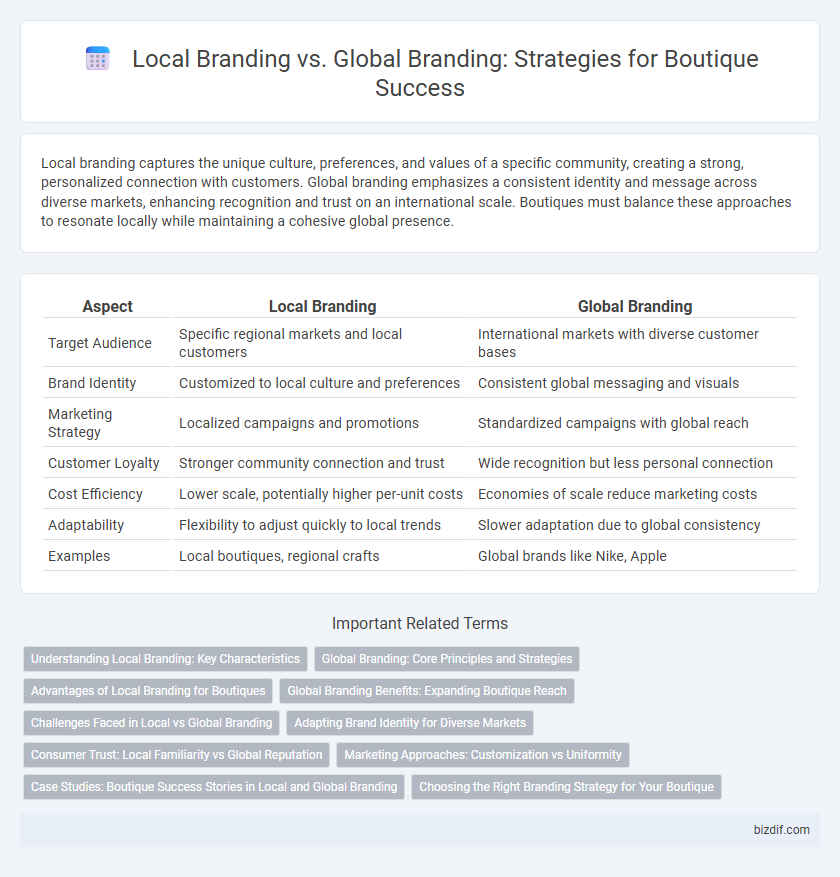Local branding captures the unique culture, preferences, and values of a specific community, creating a strong, personalized connection with customers. Global branding emphasizes a consistent identity and message across diverse markets, enhancing recognition and trust on an international scale. Boutiques must balance these approaches to resonate locally while maintaining a cohesive global presence.
Table of Comparison
| Aspect | Local Branding | Global Branding |
|---|---|---|
| Target Audience | Specific regional markets and local customers | International markets with diverse customer bases |
| Brand Identity | Customized to local culture and preferences | Consistent global messaging and visuals |
| Marketing Strategy | Localized campaigns and promotions | Standardized campaigns with global reach |
| Customer Loyalty | Stronger community connection and trust | Wide recognition but less personal connection |
| Cost Efficiency | Lower scale, potentially higher per-unit costs | Economies of scale reduce marketing costs |
| Adaptability | Flexibility to adjust quickly to local trends | Slower adaptation due to global consistency |
| Examples | Local boutiques, regional crafts | Global brands like Nike, Apple |
Understanding Local Branding: Key Characteristics
Local branding emphasizes cultural relevance, community engagement, and personalized customer experiences tailored to specific regions. It leverages local languages, traditions, and values to build strong emotional connections and brand loyalty among target audiences. This approach often includes collaborations with local businesses and influencers to enhance authenticity and trust.
Global Branding: Core Principles and Strategies
Global branding centers on establishing a consistent and recognizable identity across diverse international markets, emphasizing uniformity in messaging, visual elements, and customer experience. Core principles include cultural sensitivity, scalability, and the integration of global consumer insights to tailor campaigns that resonate universally while respecting local nuances. Strategies often involve leveraging digital platforms, strategic partnerships, and centralized brand management to maintain cohesion and strengthen worldwide brand equity.
Advantages of Local Branding for Boutiques
Local branding for boutiques enhances customer loyalty by fostering a strong community connection and cultural relevance, which drives repeat business. Tailoring products and marketing strategies to local preferences increases customer satisfaction and differentiates the boutique in a competitive market. This approach also allows for agile responses to local trends and consumer feedback, boosting brand authenticity and trust.
Global Branding Benefits: Expanding Boutique Reach
Global branding enhances a boutique's visibility by leveraging international market recognition, attracting a diverse customer base beyond local boundaries. Consistent global branding creates a unified brand identity, strengthening trust and customer loyalty across countries. This expansion enables boutiques to capitalize on worldwide trends and increase revenue through broad exposure.
Challenges Faced in Local vs Global Branding
Local branding faces challenges such as limited market reach, cultural nuances, and the need for hyper-targeted messaging to resonate with specific demographics. Global branding struggles with maintaining consistent brand identity while adapting to diverse cultural values, language barriers, and regulatory differences across regions. Both approaches require strategic balancing of authenticity and scalability to effectively engage their respective audiences.
Adapting Brand Identity for Diverse Markets
Adapting brand identity for diverse markets requires balancing local branding strategies that resonate with cultural nuances and preferences while maintaining the core values of global branding. Boutique brands excel by tailoring their messaging, visual elements, and customer experiences to align with local traditions, languages, and consumer behaviors. This approach fosters deeper connections with target audiences and enhances brand loyalty across varied geographic regions.
Consumer Trust: Local Familiarity vs Global Reputation
Local branding in boutiques leverages community connections and cultural relevance to foster strong consumer trust through familiarity and personalized experiences. Global branding offers a broad reputation and perceived reliability, attracting consumers who value established international standards and consistency. Balancing local authenticity with global prestige enhances consumer confidence and drives loyalty in diverse markets.
Marketing Approaches: Customization vs Uniformity
Local branding in boutique marketing emphasizes customization by tailoring products, services, and messaging to resonate deeply with regional cultures and consumer preferences, enhancing customer loyalty and relevance. Global branding prioritizes uniformity through standardized marketing approaches and consistent brand identity, enabling broader recognition and economies of scale across diverse markets. Balancing these strategies involves leveraging localized insights while maintaining core brand elements to optimize market penetration and brand equity.
Case Studies: Boutique Success Stories in Local and Global Branding
Boutique brands like Glossier exemplify local branding success by cultivating strong community engagement and tailored customer experiences that resonate deeply within their initial markets. Conversely, luxury brand Gucci demonstrates global branding strength through consistent brand identity, widespread cultural appeal, and strategic international marketing campaigns. These case studies highlight how boutiques can either thrive by building intimate local connections or expand influence through cohesive global positioning.
Choosing the Right Branding Strategy for Your Boutique
Selecting the ideal branding strategy for a boutique hinges on target audience analysis and market positioning. Local branding strengthens community ties and appeals to regional preferences, enhancing customer loyalty and personalized experiences. Global branding amplifies reach and consistency, leveraging universal appeal and scalability to attract diverse customer bases and compete in broader markets.
Local Branding vs Global Branding Infographic

 bizdif.com
bizdif.com